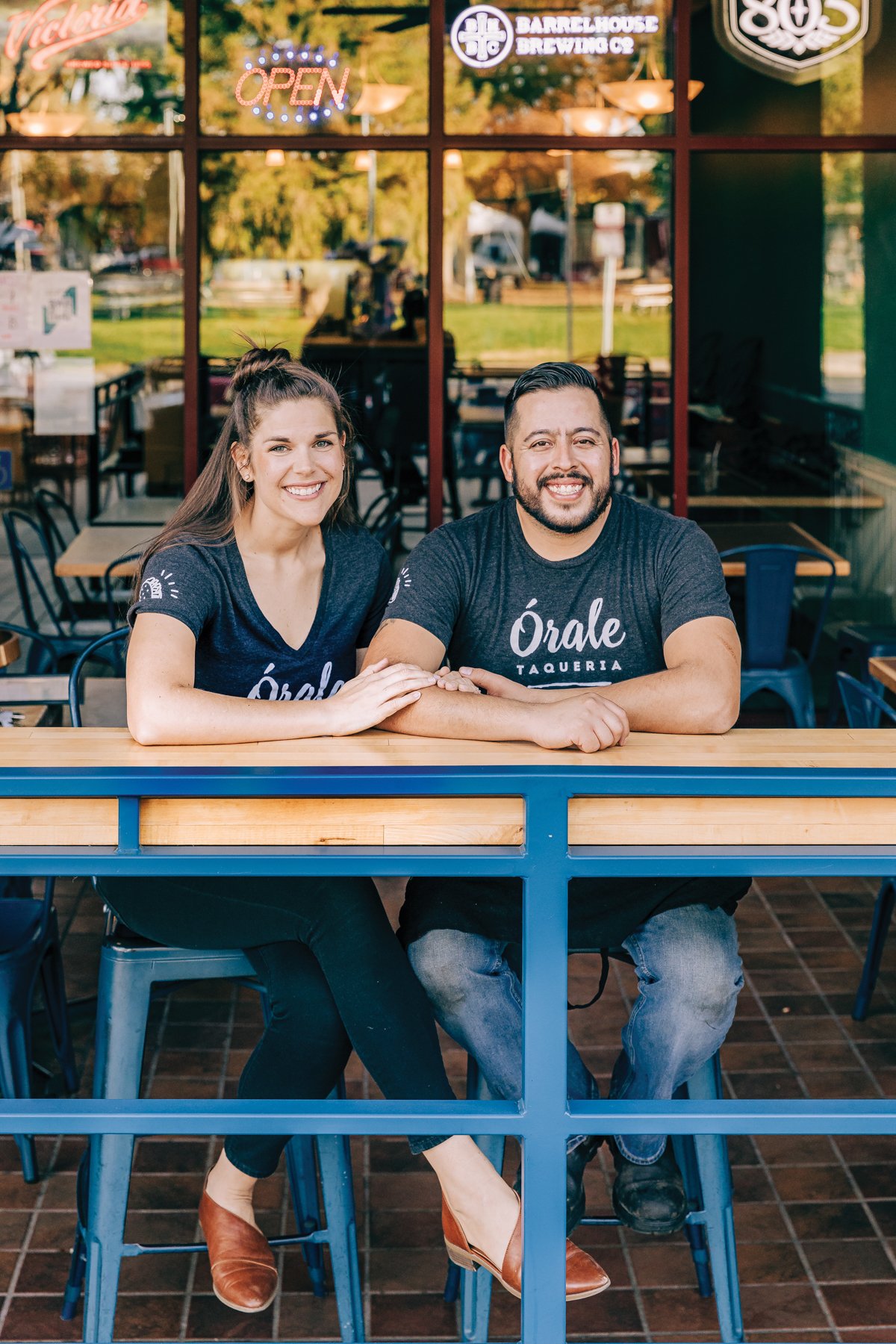
Coffee, Carpaccio and Carnitas: The American Dream in SLO County Kitchens
SLO County residents may be a diverse melting pot but they share at least one major commonality. They strive for the same goal: The American Dream. To achieve it, many labor tirelessly day after day, rising before the sun and crawling beneath the covers after midnight. A number have made a mark, and a name, with their distinctive eateries. Here are the stories of three families and their toilsome path to restaurant success.
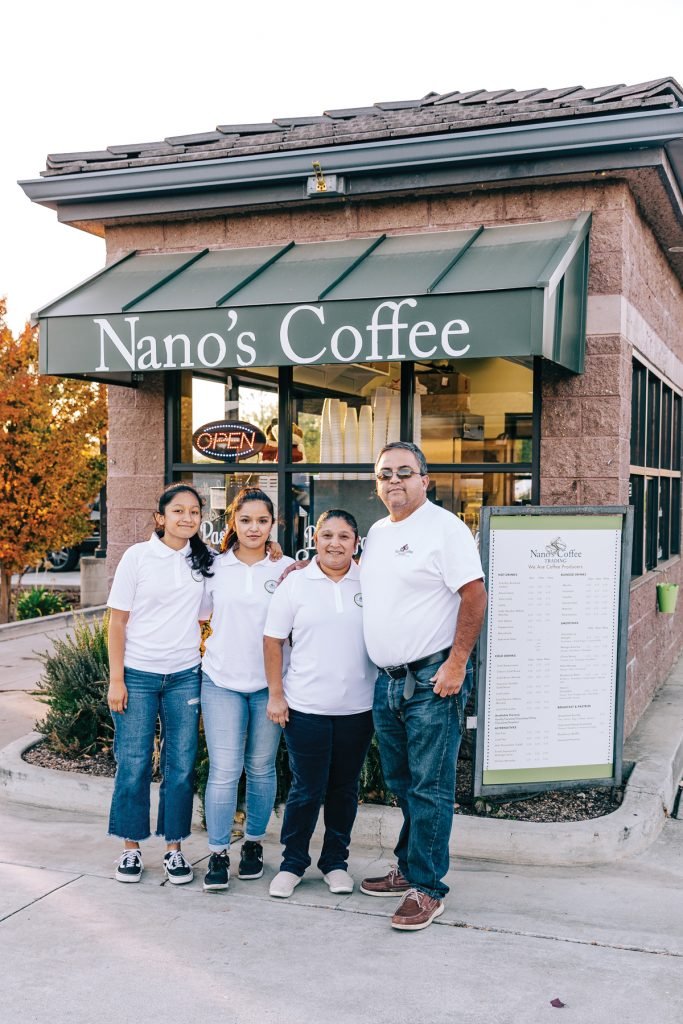
SLO County residents may be a diverse melting pot but they share at least one major commonality. They strive for the same goal: The American Dream. To achieve it, many labor tirelessly day after day, rising before the sun and crawling beneath the covers after midnight. A number have made a mark, and a name, with their distinctive eateries. Here are the stories of three families and their toilsome path to restaurant success.
A Peruvian coffee growers’ big dream
The steaming cup of coffee that millions of Americans rely on to get through the tedium of the work day is to a family of Peruvian coffee growers so much more than the caffeine.
“I relate coffee to family,” Valerie Nano, who manages Nano’s Coffee Trading in Paso Robles, says. “It’s in my blood.”
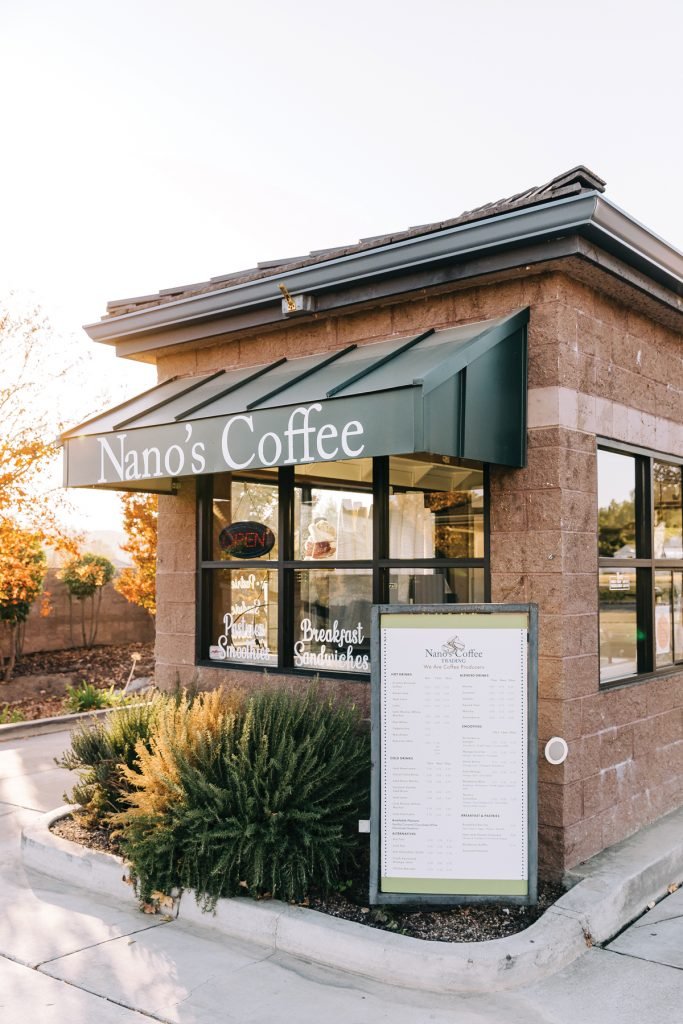
Nano’s Coffee Trading is relatively new to North County, first operating in 2018 at local farmers’ markets before opening a drive-thru café in the summer of 2020. But the Nano family, who immigrated to California in 2001, has been growing coffee beans in Peru for three generations.
In Peru’s Pasco region, where Valerie’s father was raised, the 5,500-foot elevation and rich soil of Villa Rica are prime for growing coffee plants. “The weather is a lot like Paso Robles,” she says. “Summer, winter and fall are similar but less dramatic.”
This generation of the Nano family started planting coffee beans on 25 acres of Peruvian land in 2004 and, at first, exported their beans to countries like Germany, not the States. “My father’s dream was always to grow coffee and bring it to the U.S.,” Valerie shares. Her father came up with what Valerie calls “a master plan,” in which the family would move to California, Valerie would study business administration at Cal Poly, he would plant and tend the crops and Valerie’s mother would handle the art, design and marketing for the business. When asked if her father’s plan aligned with what Valerie had envisioned for her future, she said there was never any question.
“I started drinking coffee when I was 10,” Valerie, who recalls growing up among the coffee crops, says. “I always knew I wanted to be involved. Since I was little, I wanted to open a coffee business.” Today, the family realizes this dream together, importing their own beans from Peru to roast in Atascadero, and selling wholesale bags of beans and lattes at their drive-thru, where they serve about 50 to 60 customers each day. They also sell their beans at farmers’ markets in San Luis Obispo, Morro Bay and Arroyo Grande.
“The support has been amazing. People really like that they know who grows (the coffee) and where it comes from. We let the coffee speak.” Valerie says perhaps the biggest compliment her family receives from customers is that they prefer Nano’s coffee over that of chain competitors. “When we hear we are better than Starbucks, we are very honored,” Valerie acknowledges. “We’d like to think we can maybe be like that someday but we will focus on what goes into it and how we produce (the coffee). It’s not about mass production but higher quality.”
The Nanos are confident the difference between corporate and family operated can be tasted in each cup and, though Nano Coffee Trading’s operation is relatively small in comparison, Valerie says it’s the loyal customers who energize her family to keep pursuing their dream.
An unlikely romance and plates of pasta
When she opened the restaurant with her husband in 1980, the Rizzo family matriarch had no intention of cooking the meals at Café Roma, but then, for nearly two decades, Maria Rosa Rizzo wore the white hat, preparing traditional Italian recipes for thousands of hungry customers.
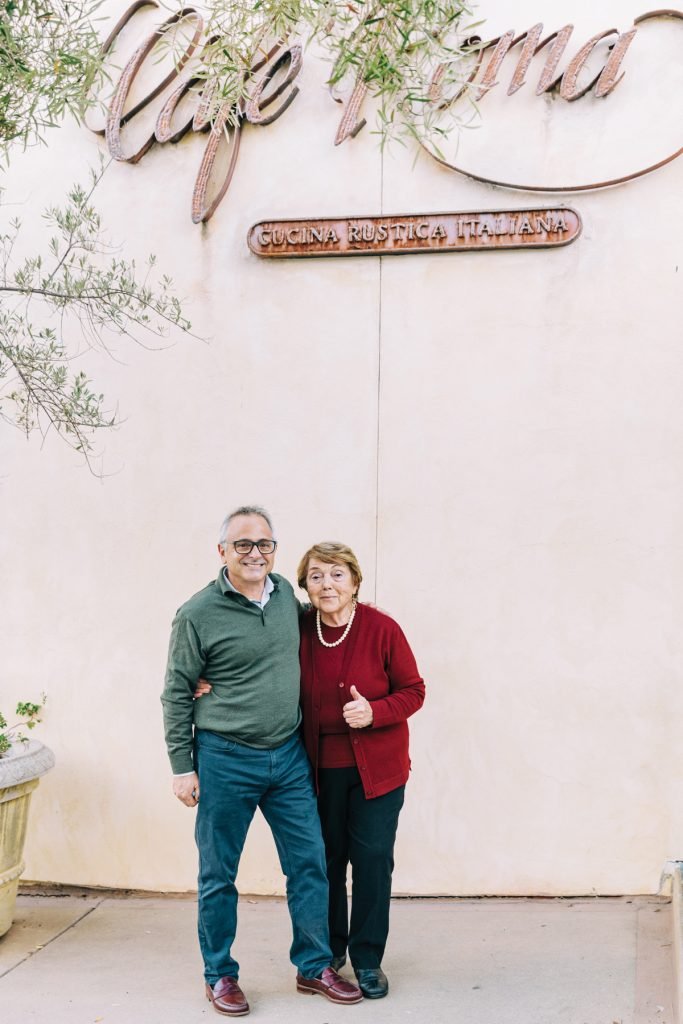
“Mom kept asking my dad who will cook the food,” Marco Rizzo, who now co-owns Café Roma with his mother and brother, says. “Opening day came around and they hadn’t found anyone, so she cooked. It was supposed to be temporary.”
Maria Rosa, who at age 80 remains involved in managing the restaurant, couldn’t have suspected in the 1960s that she would one day be curating the menu and preparing food at a restaurant in San Luis Obispo. “She was working at a hotel in Switzerland and attending school for cooking,” Marco says. “My dad traveled a lot and happened to be staying there. It was love at first sight; they married three months later.” Joseph Rizzo, a first generation American citizen born in Massachusetts to Italian parents, was a world renowned oboist who traveled the globe performing in concert halls, even contributing to the musical works of Paramount and Disney.
At just 23 years old, Maria Rosa left her home in Northern Italy to move to California with her new husband. “She was a gutsy lady,” Marco says. The newlyweds lived in Los Angeles, where Joseph partnered with acclaimed chefs in a number of restaurant ventures while dreaming of one day opening his own. But the Watts Riots — six days of violent rebellion stemming from a traffic stop involving a white officer and a Black motorist in L.A. — spurred Maria Rosa to leave and raise their children in Italy’s Pallanza.
“We can all read, write and speak Italian,” Marco says. “And the neat thing is it helped us learn other languages. All of us kids are fluent in French and Spanish, too.”
When the family reunited in California some years later, they were lured by a family friend to San Luis Obispo, where Maria Rosa and Joseph decided it was finally time to open their restaurant in the old Park Hotel building. “At the time, there were some Italian restaurants in SLO, but they were the old style heavy red sauce, spaghetti and meatballs, what people thought of as Italian in the 1980s,” shares Marco. “We had so many different menu items, new things like carpaccio and a diverse wine list.”
Marco says Café Roma’s upscale menu, which included both handmade raviolis and escargot, was surprisingly well-received in a town where dinner plates were dominated by meat and potatoes. Though he does recall one instance of hostility. “We got a letter. It said, ‘You’re charging $5 for lasagna? You’ll go broke soon!’” The criticism didn’t bother Joseph. “He said, ‘You can call me anything, just don’t call me late for dinner,’” Marco says with a laugh.
Though Marco never intended to take on a managing role at the restaurant after college, he found himself stepping into his father’s shoes when Joseph got sick. “Business was doing well but my mom needed help,” says Marco. He and his brother, Saro, decided to take a risk and invest in buying the Railroad Avenue property to further develop the restaurant, ultimately influencing the growth of what’s now known as the Railroad District.
With her sons at the helm, Maria Rosa is now able to relax and spend time visiting her homeland, though Marco says she can’t be kept away from the kitchen or the restaurant. “The restaurant is closed on Sundays for our family meals,” Marco says. “My mom doesn’t cook at the restaurant anymore but she still cooks with us boys. When we’re all in the kitchen together, she’s sharing new ideas for the restaurant.”
Starting from scratch
From a small kitchen in Paso Robles, the owner of Órale Taqueria and his staff of eight serve around 100 orders daily of burritos, loaded nachos and tacos. Restaurant Owner Joel Casillas says the El Trio Burrito, which features three types of meat, cheese and rice, is the most popular item on the menu.
He opened Órale Taqueria, which translates in English to “way to go” or “right on,” about 10 years ago after working long hours as a dishwasher at a neighboring Mexican restaurant. “The first year was difficult,” Joel remembers. “I didn’t have any friends and I was working seven days a week.”
Joel, who didn’t speak any English at the time, had left his small home town of Jalisco, Mexico at age 18 to join his father in the United States. He was inspired as a young boy to work in a restaurant after seeing a photo of his uncle behind the grill. “I remember finding out my Uncle Tony was a cook and I was so proud, like ‘my Uncle is a cook in the U.S.,’” Joel says, smiling. “I had a picture of him working at Denny’s.”
In Mexico, Joel shared a small bedroom with his six siblings and dropped out of school around the age of 12 to help earn an income for the family while his father did the same from California. Joel recalls milking cows at the farm when he was just eight years old. “I’d come home and my mom was the meal provider,” Joel says. “She made beans every day and homemade tortillas.”
At this comment, Joel’s wife Kristin makes something clear. “Don’t look at me, I’m not making you homemade tortillas every day,” she says playfully. This light-hearted ribbing is a nod to the couple’s 10-year relationship, both romantically and as business partners.
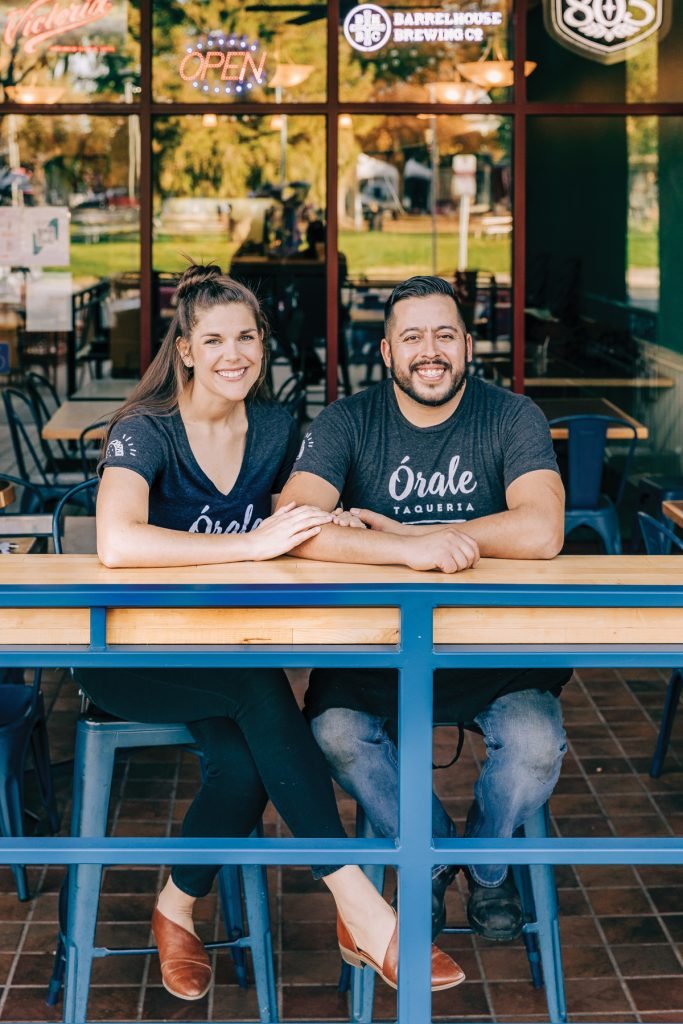
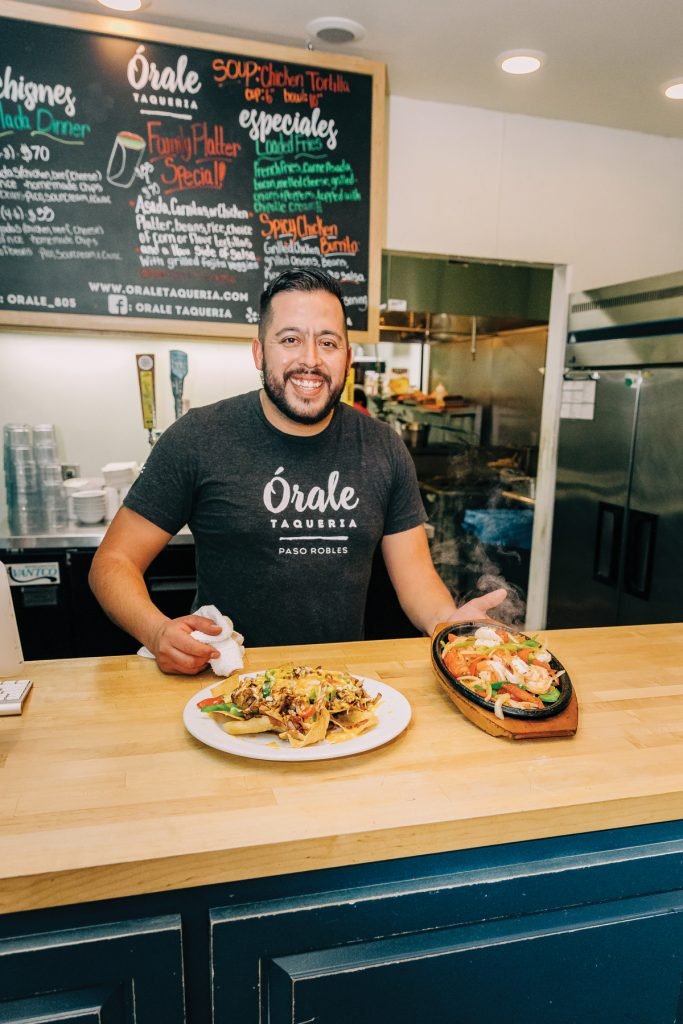
Kristin, who grew up in California and worked at a nearby café when Joel started his dishwashing job, remembers his early days in North County. “He didn’t speak English and my Spanish was really bad,” Kristin recalls, noting that it was Joel’s effervescent, happy spirit that drew her in. The pair hit it off and started dating, dreaming up visions of opening a restaurant and brainstorming ideas for the menu, whenever they went for walks together.
Joel enrolled in English language classes through Cuesta College and with Kristin’s help, he learned to speak English. After marrying in 2011 and having their first child shortly thereafter, the couple decided it was time to take a risk and poured their savings into opening the restaurant. “Joel worked from January 15th to Easter that first year with no days off,” recalls Kristin, who managed the finances and business side of the restaurant.
Along with the many hours spent fulfilling orders and crunching numbers, the couple began pursuing Joel’s official American citizenship. The process would ultimately take a decade. “Since we were married, he was a legal resident but he applied for citizenship back in 2019,” shares Kristin. “In early September, we get a call saying he has an interview in L.A. Not only are we operating the restaurant during a pandemic, but we have a 3 and a 5-year-old doing distance learning. We also just moved into our first home two weeks earlier.”
The government recognition they’d waited a decade for came like a speeding bullet. After a trip to L.A. with toddlers in tow, an interview with immigrations officials and a challenging American history exam, Joel was not only a business owner, but also an official U.S. citizen.
“Twenty-twenty has been hell but we’re finally seeing the fruits of our labor,” Kristen says.
Joel chimes in. “The American Dream? Yes, I think I’m living it now.”

